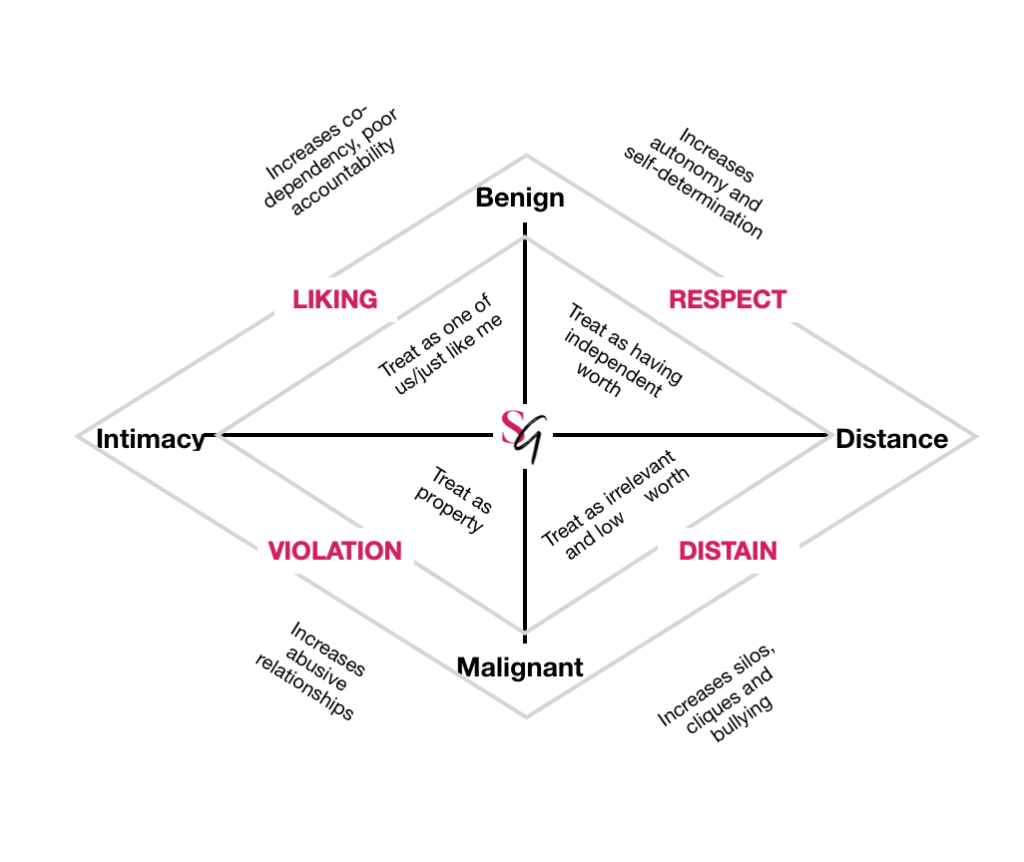
In 2014, Harvard Business Review and Tony Schwartz conducted a global study that looked into the amount of respect employees received from their boss. This study of nearly 20,000 people found that those who felt respected were more likely to have better health and well-being, experience more trust and safety, experience greater enjoyment and job satisfaction, have greater focus, prioritisation, meaning and significance at work. Those who felt respected were also more likely to stay with their organisations than those who reported a lack of respect. Despite all the positive outcomes of respect in the workplace, over half (54%) the employees surveyed claimed they didn’t regularly feel respect from their leaders.
Showing respect in the workplace is very different to liking our fellow employees. Respect and liking are both benign but only respect will create effective collaboration and influence. Liking presumes a level of intimacy that is not helpful in keeping us honest. With a friend at work, you can easily fall into the trap of letting each other off the hook if you haven’t quite delivered on what you promised. That leniency creates a conspiracy of underperformance. I won’t hold you to account for not doing x and you won’t hold me to account for not doing y. This is all unspoken of course, it is an understanding between friends.
We often see this surface at meetings. If I like you, but am not focused on showing respect, I will back your point of view without question, I will allow excuses if you are late. And you will do the same for me. I’ll scratch your back and you scratch mine. Do you see this behaviour at work?
If you have relationships like this, it’s very comfortable, but this is your wake-up call. Familiarity breeds contempt. You are not doing your best work for each other. You are not challenging each other or helping each other perform at your best. You are helping each other take the easy path.
When liking overtakes respect, the result is often discourteous and disrespectful behaviour.
Check yourself here with my 16 signs of disrespect.
How many of these are you guilty of and with whom?
- Habitually turning up late for meetings or leaving early
- Interrupting others when they are talking or working
- Checking phones and laptops in meetings
- Telling people how it is before asking them for their perspective
- Listening only to find a time to put forward your view
- Not holding others to account so they won’t hold you to account
- Not disagreeing clearly when you do disagree
- Disagreeing with the person, rather than the idea
- Steering away from conflict that should be had, in order to keep the peace
- Talking behind people’s backs (triangles)
- Being destructive, not solution-focussed
- Taking advantage of the good will of others to bend rules or increase workloads
- Micromanaging – delegating tasks, rather than responsibilities
- Assuming others are like you or see things in the same way as you
- Being dismissive of the points of view and feelings of others
- Not delivering on commitments
Respect is essential for trust. Each person is on their own path. If you’re stopped for directions to the nearest petrol station, don’t send them to the cinema instead, even if there is a great film on you know they’d enjoy. Everyone sees the world in their own way. Your employees all deserve to be given clear and kind feedback. They deserve to be listened to and for their projects to be given the same time and effort you give yours. Bosses, even friendly ones can fall into bad habits – I know I have.
3 Top Tips for Respect Over Liking
- Check the list above. I’m sure there must be at least one behaviour you could improve.
- Pick up to 3 behaviours to change this week.
- Observe what happens when you change these behaviours. How are outcomes and relationships different?
I shall be continuing with my quest to ‘ask, don’t tell’, which I struggle with every day!
Good luck – and if you have a minute, let me know which ones are your bugbears and how you’re getting on correcting your course.






